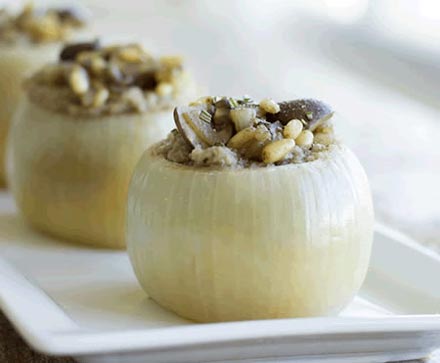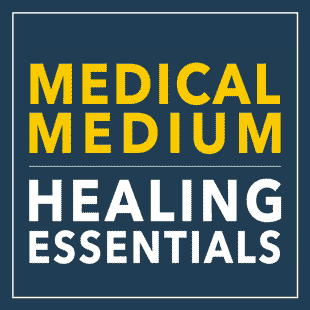Watch: Stuffed Onions

Stuffed Onions
Leeks, chives, ramps, scallions, red onions, yellow onions, white onions, shallots, and any other type of allium you enjoy are nature’s antibiotics. Unfortunately, people don’t often eat a high volume of onions—maybe just a wedge in soup once a month, or a slice once a week on top of salad. To truly benefit from onions’ antibacterial qualities, we have to make them more central to our lives.
Some people complain of digestive distress when they eat onions. Contrary to popular belief, though, onions are not irritants. Rather, they’re highly medicinal. An upset stomach from onions is an indication that someone has an elevated level of unproductive bacteria in the digestive tract. The onions are working to eliminate that bacteria, and the resulting die-off can translate to temporary discomfort.
One particular condition that many people deal with these days is SIBO, which is largely a mystery to the medical eld. What’s usually responsible for this small intestinal bacterial overgrowth are Streptococcus A and B, various strains of E. coli, C. difficile, H. pylori, Staphylococcus, and/or different varieties of fungus (excluding Candida, the natural fungus that we need to survive). Onions are one of the most accomplished foods on the planet for keeping down bacterial overgrowth in the body, making them a star for anyone who deals with SIBO.
This quality also enhances the body’s production of B12. If you avoid onions because of a sensitive digestive tract, try adding them back into your diet in very small amounts at first. Over time, their cleansing effect will enable you to tolerate larger servings of them.
We’d all do well to make friends with onions. The sulfur they contain (including the phytochemical allicin, other organosulfides, and sulfur compounds that haven’t yet been uncovered in research) is part of what makes onions nature’s antibiotic. It’s also responsible for ridding the body of radiation exposure, casting out viruses, and drawing out DDT and other pesticides, herbicides, and toxic heavy metals. The sulfur in onions makes them wonderful for alleviating joint pain, degeneration, discomfort, and for repairing tendons and connective tissue. If you have an iron deficiency, onions are also very helpful, because their sulfur content slows iron loss.
High in the trace minerals zinc, manganese, iodine, and selenium, onions help rejuvenate the skin and protect the lungs. If you’d like your skin to look younger, it’s a great idea to eat onions daily. Same goes if you used to be a smoker, and you’d like to repair some of that damage to your lungs. Onions are very helpful for addressing colds and us that cause bronchitis, and for bacteria-caused pneumonia. They’re also the ultimate anti-inflammatories for the bowels, helping to heal ulcers, eliminate mucus from the stool, and soothe the intestinal tract.
In old folklore, garlic was used to keep ghosts and ghouls away. Onions should share a similar reputation—for keeping pathogenic ghouls away. Making them part of your diet will give you a powerful immune boost and safeguard against the pathogenic world. The next time you go out to buy cough syrup or decongestant, pick up a few different types of onions at the same time— though they may not be in the same aisle, onions truly are medicine.
CONDITIONS
If you have any of the following conditions, try bringing onions into your life:
Gastroesophageal reflux disease (GERD); asthma; chronic obstructive pulmonary disease (COPD); emphysema; breast cancer; bone cancer; diverticulitis; ear infections; influenza; conjunctivitis; sties; hypertension; leukemia; migraines; prostate cancer; ringworm; rosacea; staph infections; small intestinal bacterial over- growth (SIBO); halitosis; Lyme disease; liver disease; fatty liver; herpes simplex 1 (HSV-1); herpes simplex 2 (HSV-2); HHV-6; HHV-7; the undiscovered HHV-10, HHV-11, and HHV-12; urinary tract infections (UTIs); colds; Epstein-Barr virus (EBV); yeast infections; transient ischemic attack (TIA)
SYMPTOMS
If you have any of the following symptoms, try bringing onions into your life:
Bad breath, heartburn, canker sores, iron deficiency, joint inflammation, tendon inflammation (particularly Achilles inflammation), eye issues, cold hands and feet, scars, snoring, joint pain, joint discomfort, shortness of breath, all neurological symptoms (including tingles, numbness, poor circulation, spasms, twitches, nerve pain, and tightness of the chest), restless leg syndrome, gastritis, body stiffness, body aches and pains, dizziness, dry skin, enlarged spleen, hot flashes, inflammation, jaw pain, knee pain, tremors, weakness, mineral deficiencies
EMOTIONAL SUPPORT
When you’re dealing with chronic frustration, anger, and aggravation—whether toward other people, events, or yourself—it’s critical to bring onions into your routine. Onions purge anger from the body, helping to loosen up resentment, fury, vexation, and disappointment so you can be free to live your life
SPIRITUAL LESSON
Onions are wrongly blamed for bad breath. In fact, the opposite is true—onions help alleviate bad breath. What’s really responsible for halitosis is unproductive bacteria in the gut that rises up to the mouth. Because onions are antibacterial, they help combat this problem, so that your breath becomes sweeter-smelling over time. Right after you eat an onion, there may be a lingering scent—this is just the onion’s natural sulfur, and a sign that it’s doing its job. While we focus on different toothpastes, mouthwashes, and breath mints as the answer for halitosis and scorn the onion as the enemy, it’s really our savior.
Have you ever seen this phenomenon take place in your life, where someone who worked hard to alleviate a problem mistakenly got the blame for creating the issue? It happens so often, from a supervisor at work whom employees disrespect even though that supervisor is saving their jobs, to a parent who gets flak from a child for pointing out a mistake on homework, when learning the right answer will be a key to the child’s success that semester. The next time you’re in a situation where you’re quick to point a finger, keep in mind the plight of the onion, and take a moment to analyze every angle.
TIPS
* Avoid the tip you’ll hear out there to rinse or soak onions to make them less pungent. This technique lowers onions’ potency, because it dilutes the medicinal properties that kill off bacteria and boost your immune system to keep you healthy.
* Whenever you eat a food that you know isn’t a healthy choice, incorporate some onions to counteract the detrimental effects. (This doesn’t mean you should order a plate of onion rings. Dipped in bad batter and fried in bad oil, onion rings are not advisable. Rather, if you’re eating a hot dog, pile some chopped raw onion on top.)
* When you’re eating out at restaurants and are concerned about picking up flu, viruses, norovirus, or food poisoning, order something with onions. For example, if you order a salad, get it with onion to kill off any contaminants.
* When picking out onions at the market, make sure each onion is rm and doesn’t cave in when you squeeze it. Try to avoid onions that are sprouting new green tips. (This is different from buying a fresh-picked onion with its greens still attached—those onion greens are very beneficial.)
* Experiment with different varieties of onions in different dishes. Try chives in guacamole, scallions in hummus, red onions in salads and stir-fries, leeks in soups, or try steamed yellow or white onions.
* If you’re dealing with sinus congestion, cold, or u, try placing chopped onion in a bowl of warm to hot water, draping a towel over your head and the bowl, and inhaling. This is a great technique for breaking up mucus and loosening congestion.
* If you get chilly easily, have difficulty warming up, always have to wear a sweater, and/or struggle with cold hands and feet, try to incorporate onions into your daily routine to increase circulation.
ONIONS STUFFED WITH MASHED POTATOES AND MUSHROOMS
These beautiful baked onions look like a restaurant-quality dish and are surprisingly easy to make. They look stunning on any dinner table and worthy of any party occasion. If you don’t enjoy mush- rooms, feel free to get creative and substitute the sautéed vegetable of your choice.
- 8 large onions
- 8 cups diced potatoes
- 2 teaspoons olive oil
- 1⁄2 teaspoon fresh rosemary leaves
- 8 cups chopped mushrooms
- 2 garlic cloves, minced
- 1 teaspoon sea salt
- 1 teaspoon poultry seasoning
- 2 tablespoons pine nuts
Preheat the oven to 350°F. Prep the onions by cutting off the top quarter of each. On the opposite end of each onion, cut off the root so that the onion can rest on a at surface. Do not peel. Place the onions in a large baking dish and add an inch of water. Bake until the onions are cooked through, checking periodically, 45 to 60 minutes. (Onions are done when they are soft and fragrant.) Remove from the oven and allow to cool. Peel the onions, then carefully remove the inner layers using a fork until only 2 layers remain, forming a cup. Reserve the insides of the onions for later use.
Fill a large sauté pan with an inch of water and bring to a boil. Place the potatoes in the pan, cover, and steam for 15 to 20 minutes, or until tender, stirring occasionally and adding more water if needed to prevent sticking. Place the potatoes in a food processor with 1 teaspoon of olive oil and 1⁄2 teaspoon of rosemary leaves. Process until the potatoes are smooth. Set aside.
For the mushroom filling, sauté the mushrooms and garlic in 1 teaspoon of olive oil until the mushrooms are tender and juicy, adding water as needed to prevent sticking. Transfer all but 1 cup of the sautéed mushrooms to a food processor with 1 teaspoon sea salt, 1 teaspoon poultry seasoning, and 2 cups of the reserved onion. Process until the mixture is roughly combined.
Fill the onion cups with alternating layers of mushroom filling and mashed potatoes. Top with sautéed mushrooms and pine nuts. Serve and enjoy!
Makes 4 to 6 servings
From the #1 New York Times Bestselling book Life-Changing Foods
This item posted: 19-Nov-2017
The information provided on this Site is for general informational purposes only, to include blog postings and any linked material. The information is not intended to be a substitute for professional health or medical advice or treatment, nor should it be relied upon for the diagnosis, prevention, or treatment of any health consideration. Consult with a licensed health care practitioner before altering or discontinuing any medications, treatment or care, or starting any diet, exercise or supplementation program. Neither Anthony William nor Anthony William, Inc. (AWI) is a licensed medical doctor or other formally licensed health care practitioner or provider. The content of this blog and any linked material does not necessarily reflect the opinions of Anthony William, AWI or the principal author, and is not guaranteed to be correct, complete, or up to date.
Thanks for printing this post. For more, visit www.medicalmedium.com


